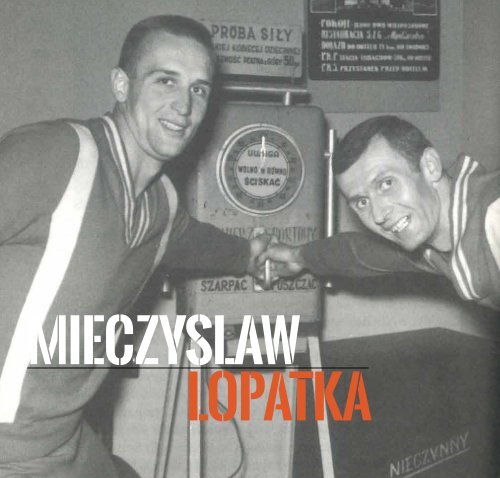MIECZYSLAW LOPATKA - 101 Greats of European Basketball
Create successful ePaper yourself
Turn your PDF publications into a flip-book with our unique Google optimized e-Paper software.
Mieczyslaw<br />
Lopatka<br />
179
The Polish legend<br />
Who was the top scorer at the<br />
World Cup 1967 in Montevideo,<br />
Uruguay? A question like that in a<br />
trivia contest would test even the<br />
most knowledgeable experts in<br />
world basketball history.<br />
The answer is Mieczyslaw Lopatka, a Polish forward<br />
considered to be the best scorer <strong>of</strong> all times in his country.<br />
In Montevideo, he scored 177 points for an average<br />
<strong>of</strong> 19.7 per game. His Polish national team finished fifth,<br />
but it also had the tournament’s second-best scorer,<br />
Bogdan Likszo, with 19.3 points per game. Finishing as<br />
the eighth-best scorer was Radivoj Korac (at 14.6 ppg)<br />
and 10th-best was tournament MVP Ivo Daneu (14.0<br />
ppg) – both <strong>of</strong> Yugoslavia. In the All-Tournament Team<br />
with Daneu were Lopatka, Luiz Claudio Menon <strong>of</strong> Brazil,<br />
Korac and Modestas Paulauskas <strong>of</strong> the Soviet Union.<br />
Lopatka, who was born on October 10, 1939, in<br />
Drachowo, Poland, was a star <strong>of</strong> <strong>European</strong> basketball<br />
in the 1960s. Poland, at the time, was one <strong>of</strong> the best<br />
national teams and won medals at the <strong>European</strong> championships.<br />
It’s true that Poland never took the top step<br />
on the medals podiums, but its principal star, Lopatka,<br />
has three <strong>European</strong> medals: silver from EuroBasket<br />
1963 in Wroclaw, and bronzes from EuroBasket 1965 in<br />
Moscow and EuroBasket 1967 in Helsinki.<br />
Before becoming an outstanding basketball player,<br />
the young Mieczyslaw practiced various sports. He<br />
started with field hockey, continued as a soccer goalkeeper,<br />
but abandoned that sport after giving up nine<br />
goals in one game. Lopatka started to train as a boxer,<br />
but when his engineer father heard about it, he had to<br />
give that up. Then he discovered handball, where coaches<br />
saw in him a great player, due to his size, 1.96 meters<br />
and 95 kilos. But it was a physical education teacher,<br />
Alexander Kwiecinski, who discovered Lopatka’s talent<br />
for basketball.<br />
Lopatka needed few games to become a key part<br />
<strong>of</strong> his school team. In one game, his team scored 150<br />
points and Lopatka had 130 by himself! Soon, in 1955,<br />
he began to play for Kolejarz Gniezno, in a small town<br />
near the village where he was born.<br />
Eyes open in Rome<br />
The best Polish clubs fixated on the young Lopatka,<br />
who, despite not reaching 2 meters, played center<br />
thanks to his strength and excellent rebounding. In 1958,<br />
he was signed by Lech Poznan and two years later participated<br />
in the 1960 Olympic Games in Rome. It’s true that<br />
Lopatka was on the Polish national team as a substitute<br />
for the injured Wlodek Pawlak, who was hurt in practice<br />
crashing into a teammate. But Lopatka’s average <strong>of</strong> 8<br />
points wasn’t bad at all for the young player. Just like other<br />
<strong>European</strong> players, Lopatka returned home from Rome<br />
enamored with the basketball played by the American<br />
“Dream Team” <strong>of</strong> that time, with Oscar Robertson, Jerry<br />
West, Walt Bellamy, Jerry Lucas and others. It was another<br />
kind <strong>of</strong> basketball the Polish had not seen before,<br />
and it motivated Lopatka to work harder.<br />
In 1961, Lopatka for the first time became the top<br />
scorer in the Polish League with 582 points. He would<br />
repeat that feat three more times: in 1963, 1966 and<br />
1967. In the 1962-63 season, playing for Slask, he<br />
scored 77 <strong>of</strong> his team’s 96 points in a game against AZS<br />
Gdansk. That remained the league record until seven<br />
years later, when Edward Jurkiewicz scored 84, to be<br />
<strong>101</strong> greats <strong>of</strong> european basketball<br />
Mieczyslaw Lopatka<br />
L
Vladimir Stankovic<br />
later topped by Mieczyslaw Mlynarski’s 90 points in<br />
1975. With Slask, Lopatka was national club champion<br />
twice, in 1965 and 1969, when he was also chosen MVP<br />
<strong>of</strong> the competition for the second time.<br />
By the time that Poland hosted EuroBasket in 1963<br />
in Wroclaw, Lopatka was already a player <strong>of</strong> reference<br />
who had to be on the national team. Poland started<br />
with a respectable 64-54 loss against the USSR, but<br />
proceeded to string together six consecutive victories<br />
and qualify for the semifinals, where the runner-up<br />
from the 1961 EuroBasket, Yugoslavia, was waiting. In<br />
a game that earned a place in Polish basketball history,<br />
the hosts won 82-73. Lopatka was his team’s top scorer,<br />
with 18 points, followed by Likszo (13) and Janusz<br />
Wichowski (12). The silver was assured. In the final, the<br />
USSR won again 61-45 behind 17 points from the giant<br />
Janis Krumins, 14 from Gennadi Volnov and 13 from<br />
Aleksandar Petrov. Radivoj Korac was the top scorer <strong>of</strong><br />
the tournament with 26.4 points per game, while Lopatka<br />
finished seventh at 15.9. His best games were 26<br />
points against France and 14 against Czechoslovakia.<br />
In an interview a few years ago, the principal hero <strong>of</strong><br />
that silver medal recalled the prize the team won: “They<br />
had given 20 dollars to each <strong>of</strong> us. Such were the times<br />
that our other prizes were a radio (that didn’t work), a refrigerator<br />
(without ice) and some tickets to buy suit fabric.”<br />
Lopatka’s second Olympic Games were in Tokyo in<br />
1964, where he scored 9.7 points per game. In 1965, he<br />
was for the first time Polish League player <strong>of</strong> the year<br />
and also won the bronze medal with Poland at Euro-<br />
Basket in Moscow, scoring 13 points per game. In 1967,<br />
in addition to shining in the World Cup at Montevideo,<br />
Lopatka won the <strong>European</strong> bronze at Helsinki.<br />
In 1968, Lopatka should have continued his career<br />
outside Poland, something that was not easy at the time<br />
for sportsmen from countries in the Soviet bloc. Standard<br />
Liege <strong>of</strong> Belgium wanted to sign him to form what<br />
would have been a fearful duo with the recently-arrived<br />
Korac. The signing deadline was August 31. Lopatka had<br />
a promise that he could leave his country due to his merits<br />
as a sportsman, but the passport was delivered to<br />
him on … September 1. He didn’t blame anyone, but he<br />
knew, as everyone did, that it was a bureaucratic means<br />
<strong>of</strong> preventing his departure to “the capitalist world.”<br />
Lopatka had to stay home, and in October <strong>of</strong> 1968,<br />
he participated in his third Olympic Games, in Mexico<br />
City, where he again was among the top performers<br />
with 19.2 points per game. In autumn <strong>of</strong> 1969, he received<br />
a great recognition by being chosen for the <strong>European</strong><br />
selection that played in Belgrade against Yugoslavia<br />
to celebrate the 25th anniversary <strong>of</strong> the Yugoslav<br />
<strong>Basketball</strong> Federation.<br />
In that game, after many years or watching Lopatka<br />
on TV, I finally had the opportunity to see him in person.<br />
It was a great <strong>European</strong> all-star team, with Paulauskas,<br />
Volnov, Sergei Belov (who had 25 points) <strong>of</strong> CSKA Moscow,<br />
Clifford Luyk and Emiliano Rodriguez <strong>of</strong> Real Madrid,<br />
Francisco Nino Buscato <strong>of</strong> Joventut Badalona, Jiri<br />
Zednicek <strong>of</strong> USK Prague and Robert Mifka <strong>of</strong> Zbrojovka<br />
Brno, among others. They defeated Yugoslavia – with<br />
veterans like Daneu, Vladimir Cvetkovic, Nemanja Djuric<br />
and Trajko Rajkovic, plus young lions like Ljubodrag Simonovic,<br />
Dragan Kapicic, Nikola Plecas and Vinko Jelovac<br />
– by the score <strong>of</strong> 93-90.<br />
Ahead <strong>of</strong> his time<br />
Buscato, a great point guard from the Spanish national<br />
team <strong>of</strong> the 1960s and ‘70s, played in that game<br />
in Belgrade with Lopatka. But he also knew Lopatka well<br />
180<br />
181
same hotel, we had the chance afterward to chat about<br />
the games. Off the court, he was very nice, open and<br />
well-mannered.”<br />
At age 33, Lopatka participated in his fourth Olympic<br />
Games in Munich in 1972. That ended his national<br />
team career after 13 years. He finished with 236 games,<br />
3,522 points and an average <strong>of</strong> 14.9 points per game.<br />
When he returned from Munich, he finally received permission<br />
to play abroad. He went to France to become<br />
player-coach with third division Montbrison. Lopatka<br />
returned home in 1976 and began to work as a head<br />
coach, and did not do badly at all. In 10 seasons with<br />
Slask Wroclaw, he was Polish League champion eight<br />
times. His son Miroslaw was taller than his father, at<br />
2.13 meters, but was far from being as dominant.<br />
Eventually, Mieczyslaw Lopatka was awarded the<br />
status <strong>of</strong> adopted son in the town <strong>of</strong> Gniezno, where<br />
his pro career started. But no matter how you look at it,<br />
his impact on the courts applies to the whole country.<br />
Mieczyslaw Lopatka is a legend in Polish basketball.<br />
Mieczyslaw Lopatka<br />
from their battles in the EuroBaskets. He remembered<br />
Mieczyslaw Lopatka like this:<br />
“He was a great player, a ‘four’ height-wise, but a<br />
‘five’ for his body and rebounding capacity,” Buscato<br />
told me. “He played excellently facing the basket, shot<br />
with both hands and moved well. He formed a great<br />
tandem with Likszo, who was tougher; Lopatka was<br />
smarter. The game <strong>of</strong> the Polish team depended on<br />
those two players, but more on Lopatka. He had what<br />
the great champions have – a winning character. In the<br />
1960s, he was one <strong>of</strong> the big players in Europe, and<br />
ahead <strong>of</strong> his time. Since our teams usually stayed in the<br />
<strong>101</strong> greats <strong>of</strong> european basketball<br />
L

















